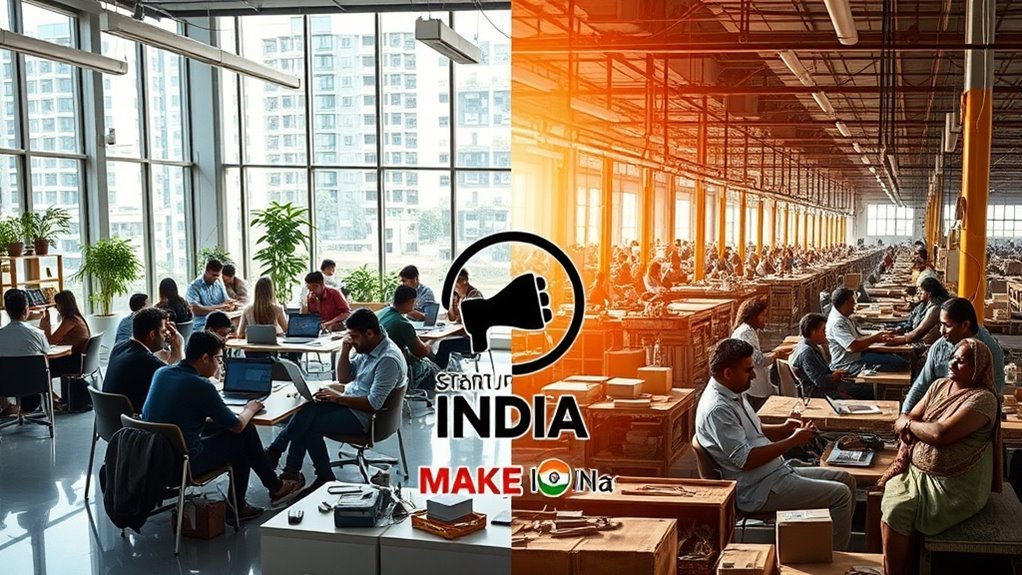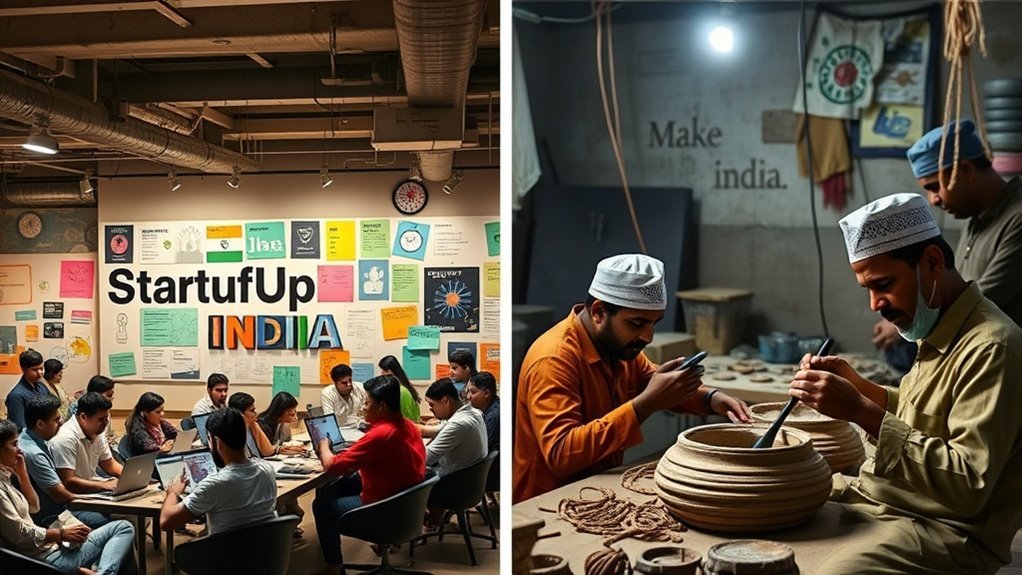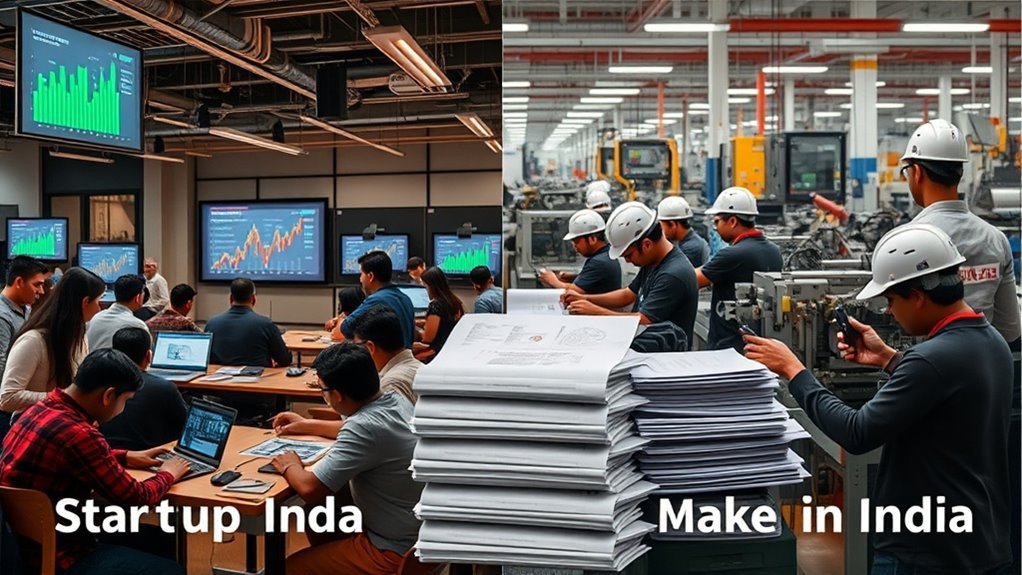Startup India vs. Make in India: What’s the Difference?
Startup India and Make in India are two distinct initiatives aimed at boosting India’s economy, each grounded in the framework of Indian laws and regulations. Startup India is designed to support technology-driven entrepreneurs by facilitating access to funding, providing mentorship, and streamlining regulatory processes. It enables startups to navigate the legal landscape more effectively, promoting innovation in various sectors.
On the other hand, Make in India focuses on enhancing the manufacturing sector by attracting domestic and foreign investment. This initiative encourages compliance with various manufacturing regulations while promoting local production through supportive policies. It emphasizes the importance of adhering to quality standards and operational guidelines laid out by Indian regulatory authorities.
While both initiatives strive to create jobs and promote economic growth, they target different audiences and industries. Startup India primarily appeals to the startup ecosystem, fostering technological advancements and entrepreneurship, whereas Make in India aims to invigorate traditional manufacturing sectors, encouraging robust supply chains and domestic manufacturing capabilities.
Understanding the nuances of these two initiatives can provide valuable insights into their unique impacts on India’s economic landscape and their future trajectories.
Key Takeaways
- Focus Area: Startup India is geared towards fostering entrepreneurial spirit and promoting tech-driven innovations in alignment with Indian laws. In contrast, Make in India emphasizes the enhancement of manufacturing capabilities and compliance with legal frameworks to attract investments.
- Target Audience: The Startup India initiative primarily caters to emerging startups, providing them guidance within the legal landscape, whereas Make in India is aimed at established manufacturers and industries, encouraging them to align with governmental regulations and standards.
- Funding Mechanisms: Startup India facilitates access to financial resources through government grants and incubation programs, all operating under the provisions of relevant Indian regulations. Meanwhile, Make in India supports the manufacturing sector with initiatives that include loans, subsidies, and tax incentives designed to comply with existing laws.
- Regulatory Approach: Startup India promotes a regulatory framework that encourages agility and innovation, minimizing bureaucratic red tape, while Make in India emphasizes adherence to stringent compliance measures to ensure quality, sustainability, and adherence to manufacturing regulations.
- Economic Objective: The objective of Startup India is to spur job creation in technology sectors that comply with legal requirements, while Make in India’s focus is on accelerating job growth within the manufacturing industries, adhering to the regulatory guidelines that govern industrial operations.
Overview of Startup India

Since its inception in January 2016, the Startup India initiative seeks to nurture innovation and entrepreneurship within the country by aligning with Indian laws and regulations.
This program aims to empower you to establish your own business by providing a range of supportive resources and benefits. You’ll have access to funding opportunities, tax exemptions, and a regulatory framework that’s designed to facilitate the startup process.
The initiative places a significant focus on mentorship and incubation, enabling connections with seasoned professionals who can assist you in navigating the challenges of launching and growing a business.
The initiative emphasizes mentorship and incubation, connecting you with experienced professionals to overcome business challenges.
Furthermore, Startup India fosters networking opportunities among entrepreneurs, allowing for the exchange of ideas and experiences. This initiative also supports economic growth and job creation across the country through its various programs.
Through this initiative, the government’s commitment to cultivating a dynamic startup ecosystem is evident, making it easier for you to realize your innovative ideas as successful ventures and contributing to the economic growth of India.
Key Objectives of Make in India
While there are numerous initiatives aimed at boosting India’s economy, the “Make in India” campaign, launched in September 2014, focuses on transforming the country into a global manufacturing hub through compliance with existing Indian laws and regulations.
One key objective is to enhance India’s manufacturing capabilities, creating jobs and fostering economic growth, in alignment with the labor laws and industrial policies.
This initiative encourages both domestic and foreign investment while ensuring adherence to legal frameworks that create a favorable business environment.
It also seeks to develop skills among the workforce, enabling individuals to meet industry demands through skill development programs supported by government regulations.
Additionally, “Make in India” promotes innovation and research within the parameters of intellectual property rights, helping businesses develop cutting-edge products.
This initiative ultimately endeavors to increase the overall contribution of manufacturing to India’s GDP and establish the country as a competitive player in the global market, all while ensuring compliance with Indian regulatory standards. Furthermore, to complement manufacturing, government initiatives like Startup India registration offer valuable support for emerging businesses in their quest for growth.
Target Audience for Each Initiative

When considering India’s initiatives such as Startup India and Make in India, it’s essential to recognize that they’re designed for distinct audiences.
Startup India primarily targets entrepreneurs and emerging startups who are seeking opportunities to innovate and expand within the framework of India’s evolving regulatory landscape. This initiative provides a supportive environment through various provisions in Indian law aimed at fostering startup growth and facilitating ease of doing business.
On the other hand, Make in India is directed towards established manufacturers and industrial sectors, encouraging them to enhance their production capabilities while adhering to Indian regulations.
This initiative emphasizes compliance with industry standards and promotes domestic manufacturing within a robust legal framework, aiming to boost the economy through strengthened industrial growth.
Understanding the specific target groups for each initiative is crucial in assessing their respective impacts on India’s economic landscape and legal environment.
Entrepreneurs and Startups
Charting the entrepreneurial landscape in India necessitates a clear understanding of the legal and regulatory frameworks surrounding initiatives like Startup India and Make in India. Each of these programs is designed to support different demographics of entrepreneurs, thus influencing their strategies for fostering entrepreneurship.
1. Startup India focuses on attracting tech-savvy entrepreneurs who are inclined towards innovation and the disruption of traditional industries. This initiative provides access to various legal provisions, such as easier compliance regulations and tax benefits for startups engaged in technology-driven innovation.
It also offers mentoring and advisory services, along with opportunities for incubation under supportive legal structures.
2. Make in India, conversely, caters primarily to traditional business owners and experienced industry veterans with an interest in enhancing the manufacturing sector. It supports initiatives aimed at increasing local production while emphasizing compliance with industrial regulations, labor laws, and quality standards that govern the manufacturing landscape in India.
3. Both initiatives promote collaboration among entrepreneurs; however, your approach should align with the corresponding frameworks and regulatory requirements based on your business model—whether that entails tech innovation under Startup India’s guidelines or adhering to manufacturing laws as encouraged by Make in India. Additionally, both programs offer unique funding opportunities that can further aid entrepreneurs in scaling their ventures.
Understanding these legal nuances will enable entrepreneurs to navigate the landscape effectively, ensuring compliance while leveraging available support.
Manufacturers and Industries
Manufacturers and industries are pivotal to the success of India’s Startup India and Make in India initiatives, both of which operate within the framework of the country’s laws and regulations.
Startup India primarily targets technology-driven startups, fostering innovation and creating a dynamic ecosystem underpinned by supportive regulatory measures. This initiative encourages entrepreneurs to navigate the legal landscape efficiently, ensuring their ventures can thrive within India’s vibrant tech sector.
Conversely, Make in India is focused on bolstering traditional manufacturing sectors and aligns with various regulations aimed at enhancing domestic production. This initiative encourages companies to comply with local laws while emphasizing quality and competitiveness in manufacturing processes.
For manufacturers, adhering to the guiding principles of Make in India means not only complying with industry standards but also taking advantage of government frameworks designed to facilitate growth. Moreover, MSME registration offers legal recognition and various benefits that can further enhance the sustainability of small enterprises within both initiatives.
Both initiatives offer distinct opportunities linked to regulatory frameworks that enhance different segments of the industry, enabling a comprehensive approach to economic development in India.
Funding and Support Mechanisms
Funding and support mechanisms are critical components in the landscape of Indian entrepreneurship and manufacturing. Both Startup India and Make in India provide unique frameworks designed to foster innovation and strengthen the manufacturing sector in compliance with Indian laws and regulations.
Funding and support mechanisms are essential for advancing Indian entrepreneurship and manufacturing, with Startup India and Make in India fostering innovation within regulatory frameworks.
Here’s an overview of how these initiatives differ:
- Startup India: This initiative is aimed at promoting entrepreneurship by providing financial assistance through government-backed funds, grants, and equity investments specifically designed for startups. It operates within the legal frameworks established by the Ministry of Commerce and Industry, encouraging compliance with relevant regulations for startup businesses.
- Make in India: This initiative focuses on enhancing the manufacturing sector by facilitating loans and providing subsidies and tax incentives specifically aimed at larger manufacturing units. It operates under laws governing industrial development and promotes compliance with standards to ensure sustainable and efficient scaling of manufacturing activities.
- Incubation and Mentorship: Under the Startup India initiative, there’s an emphasis on incubation and mentorship programs that assist startups in refining their products and business strategies, all while adhering to the governing laws of intellectual property and company registration. Additionally, these initiatives highlight the importance of funding options like grants which can help startups and manufacturers in navigating their financial challenges more effectively.
Meanwhile, Make in India emphasizes the improvement of production processes and technology transfer, ensuring that firms comply with existing manufacturing regulations.
These funding and support frameworks can significantly impact your entrepreneurial journey or manufacturing goals within the Indian regulatory landscape.
Regulatory Framework and Compliance

Navigating the entrepreneurial landscape in India necessitates a thorough understanding of the country’s regulatory framework and compliance requirements. This is crucial for both startups and manufacturing firms, as adherence to these regulations is a pivotal element of business success.
Startups often experience comparatively lighter regulatory burdens, which enables them to pivot quickly and foster innovation without being encumbered by excessive bureaucratic processes. Nonetheless, they must still engage with essential compliance areas such as business registration, tax obligations, and the protection of intellectual property rights.
Conversely, initiatives like “Make in India” introduce more stringent regulations that focus on ensuring quality and sustainability within the manufacturing sector. Businesses operating in this arena must be prepared to comply with a myriad of requirements, including obtaining environmental clearances, adhering to labor laws, and meeting safety standards.
A comprehensive understanding of these legal obligations is crucial to avoid penalties and legal complications, and it ensures that your business operates within the frameworks established by Indian law. Additionally, entrepreneurs should prioritize essential compliance requirements to lay a solid foundation for their ventures.
Impact on Job Creation
Although both Startup India and Make in India aim to promote economic growth, their implications for job creation are notably distinct within the framework of Indian laws and regulations.
1. Startup India emphasizes the importance of innovation and entrepreneurship as fundamental drivers of economic development. This initiative encourages the establishment of new ventures, particularly in the tech and creative sectors. While this can lead to the emergence of dynamic job opportunities, particularly for skilled professionals, it can also result in a more volatile job market, often influenced by the success and scalability of startups.
2. Make in India, in contrast, places a strong emphasis on bolstering manufacturing capabilities in accordance with the government’s plans to enhance industrialization. This initiative is designed to create a significant number of jobs in conventional sectors, aligning with labor laws that aim to protect workers’ rights and promote stable employment.
The manufacturing focus facilitates the creation of roles that often provide long-term job security.
3. Despite startups initially generating fewer jobs as they’re often at the nascent stage of development, they possess the potential for substantial growth in the longer term. Moreover, programs like MSME loan schemes serve as additional support for both initiatives by providing financial assistance to emerging businesses, thereby enhancing job creation efforts.
On the other hand, Make in India initiatives are structured to deliver mass employment opportunities, benefiting a wide range of individuals, from highly skilled to unskilled labor, in compliance with existing labor regulations.
Grasping these distinctions is essential for understanding how each initiative influences the job landscape and aligns with India’s legal and regulatory framework.
Future Prospects and Challenges
As you look ahead, the potential for economic growth from both initiatives under Indian laws and regulations is significant, but you’ll encounter various regulatory hurdles that could impede progress.
It’s crucial to understand how these factors interrelate, including compliance with local and national legal requirements, environmental regulations, and sector-specific mandates.
Let’s explore what the future might hold in the Indian landscape and the challenges you might face in navigating these complex regulations.
Economic Growth Potential
When analyzing the economic growth potential of Startup India and Make in India within the framework of Indian laws and regulations, it becomes evident that both initiatives present distinct opportunities despite facing unique challenges.
Startup India primarily promotes innovation and entrepreneurship in compliance with various legal frameworks, while Make in India is geared toward enhancing manufacturing and infrastructure development under specific regulatory guidelines.
Here are three key aspects to consider:
1. Job Creation:
Startup India contributes to job opportunities, particularly in tech sectors, aligning with labor laws that support skill development and employment generation.
Conversely, Make in India targets job growth in the manufacturing sector, adhering to regulations that promote industrial growth and workforce expansion.
2. Investment Attraction:
Both initiatives effectively attract domestic and foreign investments; however, they focus on different sectors—technology for Startup India and manufacturing for Make in India.
Regulatory frameworks, such as the Foreign Direct Investment (FDI) policies, play a critical role in shaping investment landscapes for both initiatives, ensuring compliance with foreign exchange regulations.
3. Global Competitiveness:
By fostering innovation in alignment with intellectual property rights and technology transfer regulations, Startup India aims to enhance India’s competitive edge in the tech industry.
Meanwhile, Make in India reinforces the country’s position as a global manufacturing hub, supported by policies that encourage domestic production and compliance with international standards.
These aspects underscore the integral roles of Startup India and Make in India in shaping India’s economic landscape while navigating the complexities of laws and regulations.
Regulatory Hurdles Ahead
Despite the promising outlook for both Startup India and Make in India, navigating the regulatory landscape presents significant hurdles that could impede their progress. Entrepreneurs may encounter intricate compliance requirements and bureaucratic processes that can slow down their journey.
Licensing processes can differ widely between states, leading to confusion and inconsistency. Moreover, the absence of clear guidelines and supportive infrastructure can hinder innovation and discourage potential investors.
Complicated taxation rules can further complicate financing options, particularly for startups that require flexibility. These regulatory barriers may not only delay project timelines but also divert attention from focusing on growth initiatives. Proper adherence to annual secretarial compliance is essential to avoid penalties and foster a favorable business environment.
To successfully overcome these challenges, it’s crucial for startups and manufacturing ventures to engage in strategic planning, remain adaptable, and adopt a proactive approach to thrive in this competitive ecosystem.
Questions
How Do These Initiatives Affect Foreign Investment in India?
These initiatives significantly enhance foreign investment in India by fostering a regulatory environment conducive to business growth. By streamlining processes and minimizing bureaucratic obstacles, they create a more navigable landscape for international investors. Additionally, the emphasis on robust infrastructure development attracts global players seeking opportunities for expansion and innovation within the Indian market.
What Are the Long-Term Economic Implications of Each Initiative?
Each initiative under Indian law fosters innovation and manufacturing, driving job creation and economic growth. Over the long term, these efforts contribute to increased competitiveness and technological advancements, which positively impact India’s global trade landscape. Additionally, they attract sustained foreign investments across diverse sectors, creating a more robust and resilient economy. Compliance with regulations ensures that these initiatives align with national priorities and drive sustainable development, further solidifying India’s position in the global market.
How Can Entrepreneurs Engage With Both Programs Effectively?
Entrepreneurs can engage effectively with Startup India and Make in India by taking advantage of the funding and mentorship opportunities provided under Startup India, while simultaneously utilizing the manufacturing incentives offered by Make in India. Networking with industry peers and attending workshops can deepen your understanding of Indian laws and regulations related to both initiatives, enhancing your ability to navigate the regulatory landscape and seize opportunities for growth in the Indian market.
What Role Do Startups Play in India’s Manufacturing Sector?
Startups play a pivotal role in India’s manufacturing sector by fostering innovation through the application of advanced technologies and streamlined processes, in line with national policies and regulations. They contribute to increased productivity and job creation while remaining agile in adapting to market shifts. Compliance with government regulations allows these startups to operate within a legal framework that supports competitiveness in a rapidly evolving global landscape. By integrating sustainable practices and adhering to quality standards outlined by Indian laws, startups can significantly enhance the manufacturing ecosystem, ultimately contributing to the nation’s economic growth.
Are There Any Successful Case Studies From Each Initiative?
Yes, there are successful case studies. For instance, OYO, which emerged from the Startup India initiative, has played a transformative role in the hospitality industry through compliance with regulations and leveraging technology. Similarly, under the Make in India initiative, companies like Mahindra have effectively utilized local manufacturing, adhering to Indian laws, which has significantly boosted production efficiency and job creation within the sector.







